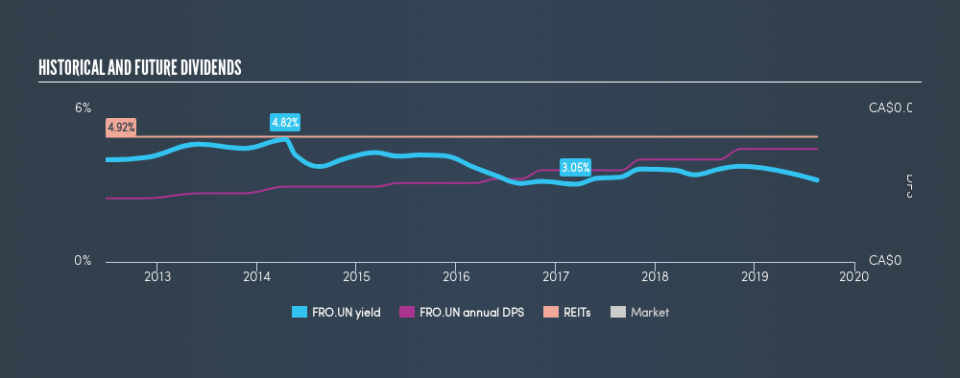Does Fronsac Real Estate Investment Trust (CVE:FRO.UN) Have A Place In Your Dividend Portfolio?

Today we'll take a closer look at Fronsac Real Estate Investment Trust (CVE:FRO.UN) from a dividend investor's perspective. Owning a strong business and reinvesting the dividends is widely seen as an attractive way of growing your wealth. On the other hand, investors have been known to buy a stock because of its yield, and then lose money if the company's dividend doesn't live up to expectations.
With a goodly-sized dividend yield despite a relatively short payment history, investors might be wondering if Fronsac Real Estate Investment Trust is a new dividend aristocrat in the making. We'd agree the yield does look enticing. Some simple research can reduce the risk of buying Fronsac Real Estate Investment Trust for its dividend - read on to learn more.
Click the interactive chart for our full dividend analysis
Payout ratios
Companies (usually) pay dividends out of their earnings. If a company is paying more than it earns, the dividend might have to be cut. As a result, we should always investigate whether a company can afford its dividend, measured as a percentage of a company's net income after tax. Although Fronsac Real Estate Investment Trust pays a dividend, it was loss-making during the past year. A payout ratio above 50% generally implies a business is reaching maturity, although it is still possible to reinvest in the business or increase the dividend over time.
The company paid out 67% of its free cash flow, which is not bad per se, but does start to limit the amount of cash Fronsac Real Estate Investment Trust has available to meet other needs.
REITs like Fronsac Real Estate Investment Trust often have different rules governing their distributions, so a higher payout ratio on its own is not unusual.
Consider getting our latest analysis on Fronsac Real Estate Investment Trust's financial position here.
Dividend Volatility
From the perspective of an income investor who wants to earn dividends for many years, there is not much point buying a stock if its dividend is regularly cut or is not reliable. Fronsac Real Estate Investment Trust has been paying a dividend for the past seven years. The dividend has been quite stable over the past seven years, which is great to see - although we usually like to see the dividend maintained for a decade before giving it full marks, though. During the past seven-year period, the first annual payment was CA$0.013 in 2012, compared to CA$0.022 last year. Dividends per share have grown at approximately 8.6% per year over this time.
The dividend has been growing at a reasonable rate, which we like. We're conscious though that one of the best ways to detect a multi-decade consistent dividend-payer, is to watch a company pay dividends for 20 years - a distinction Fronsac Real Estate Investment Trust has not achieved yet.
Dividend Growth Potential
The other half of the dividend investing equation is evaluating whether earnings per share (EPS) are growing. Over the long term, dividends need to grow at or above the rate of inflation, in order to maintain the recipient's purchasing power. Strong earnings per share (EPS) growth might encourage our interest in the company despite fluctuating dividends, which is why it's great to see Fronsac Real Estate Investment Trust has grown its earnings per share at 18% per annum over the past five years. Earnings per share have been growing rapidly, but given that it is paying out more than half of its earnings as dividends, we wonder how Fronsac Real Estate Investment Trust will keep funding its growth projects in the future.
We'd also point out that Fronsac Real Estate Investment Trust issued a meaningful number of new shares in the past year. Trying to grow the dividend when issuing new shares reminds us of the ancient Greek tale of Sisyphus - perpetually pushing a boulder uphill. Companies that consistently issue new shares are often suboptimal from a dividend perspective.
Conclusion
To summarise, shareholders should always check that Fronsac Real Estate Investment Trust's dividends are affordable, that its dividend payments are relatively stable, and that it has decent prospects for growing its earnings and dividend. Fronsac Real Estate Investment Trust's is paying out more than half its income as dividends, but at least the dividend is covered by both reported earnings and cashflow. Second, the company has not been able to generate earnings growth, and its history of dividend payments too short for us to thoroughly evaluate the dividend's consistency across an economic cycle. While we're not hugely bearish on it, overall we think there are potentially better dividend stocks than Fronsac Real Estate Investment Trust out there.
Are management backing themselves to deliver performance? Check their shareholdings in Fronsac Real Estate Investment Trust in our latest insider ownership analysis.
We have also put together a list of global stocks with a market capitalisation above $1bn and yielding more 3%.
We aim to bring you long-term focused research analysis driven by fundamental data. Note that our analysis may not factor in the latest price-sensitive company announcements or qualitative material.
If you spot an error that warrants correction, please contact the editor at editorial-team@simplywallst.com. This article by Simply Wall St is general in nature. It does not constitute a recommendation to buy or sell any stock, and does not take account of your objectives, or your financial situation. Simply Wall St has no position in the stocks mentioned. Thank you for reading.

